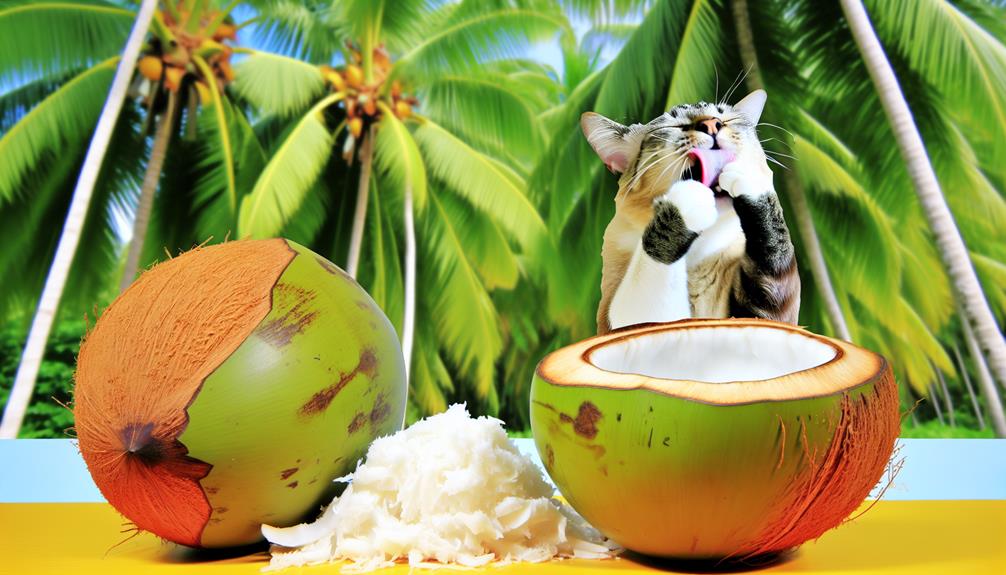Ever wondered if coconut could be a tropical treat for your feline friend? It's not a straightforward yes or no. While coconut can offer some health benefits like improved skin and coat condition, it's essential to remember that cats are obligate carnivores. Adding coconut to their diet requires caution and moderation. You should also be aware of potential digestive issues or allergies that could arise. So, what do the experts say, and how should you introduce it safely? Let's explore this further.
Nutritional Value of Coconut
Understanding the nutritional value of coconut is vital if you're considering adding it to your cat's diet. Different coconut types, such as coconut milk, coconut water, and shredded coconut, each have unique nutritional profiles. These variations can provide distinct benefits and potential risks, so it's important to be well-informed.
Coconut types like shredded coconut and coconut milk contain moderate amounts of fat and carbohydrates. While coconut is rich in medium-chain triglycerides (MCTs), which can offer energy and aid digestion, it's important to remember that cats are obligate carnivores. Their primary nutritional needs are met through animal proteins and fats, not plant-based sources. Consequently, coconut should only be a minor part of their diet, if at all.
When considering coconut preparation, you should be cautious. Raw coconut can be difficult for cats to digest and might cause gastrointestinal issues such as diarrhea or constipation. If you decide to offer coconut to your cat, opt for small, unsweetened, and unflavored portions. Avoid any form of coconut that contains additives, preservatives, or added sugars, as these can be harmful to your cat.
Moreover, be mindful of the overall fat content. While MCTs in coconut can be beneficial in moderation, excessive fat intake can lead to obesity or pancreatitis in cats. Incorporating coconut into your cat's diet requires careful consideration and consultation with your veterinarian to confirm it won't disrupt their nutritional balance.
Coconut Oil for Cats
When it comes to coconut oil for cats, many pet owners wonder about its potential benefits and risks. It's natural to be cautious about introducing new substances into your cat's diet or grooming regimen. Coconut oil has certainly gained popularity for its various health claims, but how does it fare for your feline friend?
Coconut oil benefits can range from improving skin health to aiding digestion. However, it's vital to remember that what works for humans doesn't always work for cats. Cats have unique dietary needs and sensitivities, so always consult your veterinarian before making any changes.
In terms of coconut oil application, it can be used both topically and orally. When applied to your cat's skin, coconut oil may help soothe dryness or irritation. It can also act as a natural moisturizer, potentially improving coat shine and texture. Some cat owners use a small amount to help with flea infestations, as the oil can smother these pests.
If you're considering adding coconut oil to your cat's diet, start with a very small amount, like a quarter teaspoon mixed into their food. Monitor your cat closely for any signs of digestive upset, such as vomiting or diarrhea.
While coconut oil benefits are promising, they aren't guaranteed, and some cats may not tolerate it well. Always be observant and responsive to your cat's reactions. Ultimately, your veterinarian can provide the best guidance tailored to your cat's specific health needs. When used responsibly, coconut oil might offer some advantages, but it's important to weigh these against any potential risks.
Potential Health Benefits

The potential health benefits of coconut oil for cats are a topic of keen interest among pet owners. When considering coconut varieties, it's clear that coconut oil stands out for its potential advantages, which may appeal to your feline friend's specific needs and preferences.
One of the most talked-about benefits is the improvement in skin and coat health. Coconut oil boasts moisturizing properties that can help alleviate dry skin and reduce shedding. Applied topically or mixed with food, it can make your cat's fur softer and shinier. Furthermore, coconut oil contains lauric acid, known for its anti-inflammatory and antimicrobial properties. This can assist in healing minor cuts, hot spots, and other skin irritations.
Digestive health is another area where coconut oil may shine. Some cats experience digestive issues, and a small amount of coconut oil can act as a mild laxative, promoting smoother digestion and easing constipation. The medium-chain triglycerides (MCTs) found in coconut oil are also easily digestible and can provide a quick source of energy, which is particularly beneficial for older or less active cats.
Additionally, coconut oil may help in maintaining a healthy weight. While it's not a miracle diet solution, the MCTs can contribute to better metabolism and energy utilization, aiding in weight management when used in moderation.
Risks and Side Effects
It's important to be aware of potential allergic reactions and the impact on your cat's digestive system when introducing coconut. Some cats may experience symptoms like itching or gastrointestinal upset. Always monitor your cat closely and consult your vet if you notice any adverse effects.
Potential Allergic Reactions
Introducing coconut into your cat's diet could potentially lead to allergic reactions, which is something every pet owner should be aware of. Coconut allergies in cats, while not extremely common, can still occur. Feline sensitivities vary from one cat to another, and what works for one might not be suitable for another.
There are several symptoms to watch for if you suspect your cat has a coconut allergy:
| Symptom | Description |
|---|---|
| Itching | Excessive scratching or grooming. |
| Swelling | Swollen face, paws, or other areas. |
| Gastro Issues | Vomiting or diarrhea. |
If your cat exhibits any of these symptoms after consuming coconut, it's best to consult your veterinarian immediately. They can provide a proper diagnosis and suggest alternative dietary options. Remember, even natural foods can pose risks if your cat is sensitive to them.
Being cautious and observant is key. Before introducing any new food, including coconut, into your cat's diet, always start with a small amount. Monitoring for any adverse reactions can help you make informed decisions regarding your feline friend's health. Your cat's well-being should always come first, and understanding potential allergic reactions is vital for their safety.
Digestive System Impact
When evaluating adding coconut to your cat's diet, it is crucial to understand the potential digestive system impacts. While coconut isn't toxic to cats, it can still pose some risks to their digestive health. Cats have a unique digestive system that isn't always equipped to handle certain human foods, and coconut is one of them.
One primary concern is the high fat content in coconut. Even though these fats are deemed healthy for humans, they can be troublesome for feline digestion. Cats may have difficulty breaking down the fats, leading to issues such as diarrhea or upset stomach. These symptoms can be particularly challenging for cats with already sensitive digestive systems.
Additionally, the fibrous nature of coconut can be tough on a cat's digestive tract. Excessive fiber can cause gastrointestinal distress, including bloating and constipation. This is especially important to take into account if your cat isn't accustomed to high-fiber foods.
Feeding Guidelines

When introducing coconut to your cat's diet, it's important to start with small portions to observe any adverse reactions. You should offer coconut no more than twice a week, ensuring it complements a balanced diet rather than replacing it. Always consult your veterinarian to tailor the feeding guidelines to your cat's specific needs.
Portion Size Recommendations
Determining the right portion size for feeding your cat coconut is vital for their health and well-being. With various coconut types available, including fresh coconut meat, coconut oil, and coconut milk, it's important to offer the right amount to avoid digestive issues. Cats are obligate carnivores, so while small amounts of coconut can be safe, they shouldn't replace their primary diet.
For fresh coconut meat, serving suggestions include giving no more than a small, pea-sized piece at a time. This guarantees your cat enjoys the taste without overloading their system. When it comes to coconut oil, start with a tiny dab, about the size of a grain of rice. Gradually, you might increase this to a quarter teaspoon, but only if your cat tolerates it well. Coconut milk, on the other hand, should be given sparingly. A teaspoon as an occasional treat can be sufficient, but it's important to avoid any coconut milk with added sugars or preservatives.
Frequency of Feeding
Although cats can enjoy the occasional treat of coconut, it's crucial to monitor how often you offer these indulgences to maintain their health. Coconut, while not toxic to cats, should be given sparingly due to its high fat content and the potential for digestive issues if consumed in excess. By managing the coconut frequency in your cat's diet, you can guarantee their overall well-being.
To help you maintain a balanced feeding routine, consider these guidelines:
- Limit Treats: Offer coconut no more than once a week. This minimizes the risk of any adverse reactions and guarantees it remains a special treat rather than a staple in their diet.
- Monitor Reactions: After introducing coconut, observe your cat for any signs of digestive upset, such as diarrhea or vomiting. Adjust the frequency accordingly if any issues arise.
- Balance Nutrition: Ensure that the majority of your cat's diet consists of high-quality cat food specifically designed to meet their nutritional needs. Coconut should complement, not replace, their regular feeding habits.
Expert Opinions
Experts in the field of veterinary nutrition have begun to weigh in on the topic of cats and coconut, shedding light on its potential benefits and risks. When considering cat preferences, it's important to recognize that not all cats may enjoy the taste or texture of coconut. Some might be drawn to the flavor, while others might completely ignore it. Additionally, coconut varieties can play a role in how your feline friend might react. For example, fresh coconut meat differs markedly from processed coconut oil regarding texture and nutritional content.
Veterinarians generally agree that small amounts of coconut are not likely to harm your cat. Dr. Rebecca Greenstein, a well-known veterinarian, suggests that while coconut isn't toxic to cats, it should be given sparingly. The high-fat content, especially in coconut oil, can lead to gastrointestinal upset or even pancreatitis in some cats. You'll want to monitor your cat closely the first few times you offer coconut to confirm there's no adverse reaction.
On the flip side, some experts point out potential benefits. Coconut oil, for instance, is known for its antimicrobial properties and might help with certain skin conditions when applied topically. However, Dr. Sarah Goldstein warns that these benefits are largely anecdotal and more research is needed to understand its efficacy fully.
Ultimately, the consensus among experts is clear: while coconut can be an occasional treat, it shouldn't replace a balanced, species-appropriate diet. Always consult your veterinarian before introducing any new food into your cat's diet to confirm it's safe and appropriate for your specific pet.
Conclusion
In summary, while coconut can be a beneficial treat for your cat, think of it as a delicate spice in a gourmet meal—used sparingly. Its moisturizing properties and MCTs can enhance your cat's well-being, but remember, they're obligate carnivores. Introduce it slowly and always consult your vet to avoid any potential risks. Your cat's health is paramount, so let's guarantee their diet remains balanced and safe.
